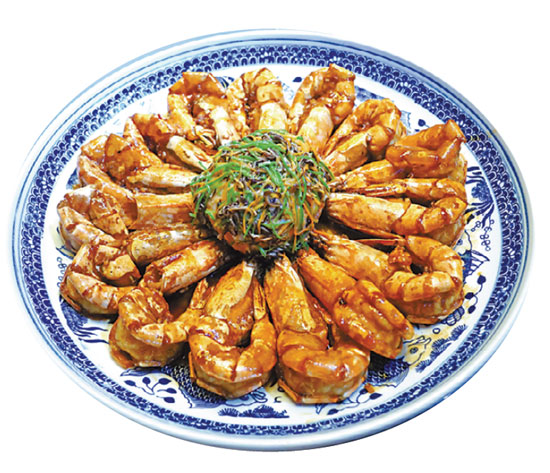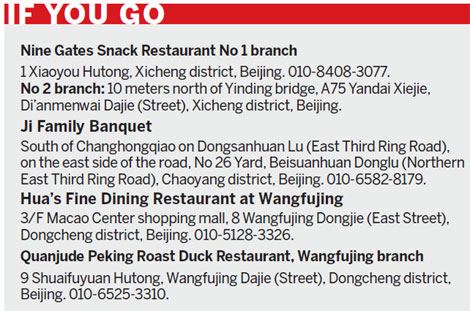

|
Bingtanghulu, or skewers of candied haws, are a traditional winter snack in Beijing. Nine Gates Snack Restaurant holds a Snack and Traditional Custom Festival from Jan 25 to Feb 15, in which 22 traditional Beijing snack shops participate. Photos provided to China Daily |
Beijing's festive culture will be on display this holiday week. Ye Jun samples the celebratory cuisines.
When in Beijing, eat as Beijingers do. Some of the capital's restaurants are offering typical Beijing foods during the Spring Festival. Take the chance to dig in and find out more about city's festive culture.
Nine Gates Snack Restaurant, for example, offers a great variety of traditional Beijing snacks. These can give you an idea of what you will find in the city's temple fairs during the Spring Festival holiday. Only, here, you can find them all conveniently in one stop.
Nine Gates Snack Restaurant, which recently reopened, will hold a Snack and Traditional Custom Festival from Jan 25 to Feb 15.
The eatery's name refers to Beijing's old city gates that had watchtowers on them, such as Zhengyangmen, Dongzhimen, Xizhimen, Chaoyangmen, Fuchengmen and Deshengmen. Some of these gates still remain, while others have disappeared.
The courtyard-style restaurant located inside the scenic Shichahai Lake area has recruited some of the most traditional Beijing snack shops. Heirs of traditional Beijing snackmakers will showcase their skills in a food street inside the restaurant.
Just look at their names and you'll know what they make - Feng's quick-boiled tripe, Wei's cheese, Qian's rice cakes, Ma's lamb head, Bai's bean curd, and Li's fried flour tea, to name just a few.
A total of 22 traditional Beijing snack shops will participate in the food festival. They will make and sell more than 100 traditional foods on the spot. If you are curious about what aiwowo, "donkey roll over", and baggy cake taste and look like, it's a good chance to check them out.
Some other snacks worth trying are white bean rolls, deep-fried flour cakes with beef and lamb filling, "cat-ear" dough balls, and steamed and deep-fried dumplings.
On the other hand, one can choose to dine at a decent Beijing-style restaurant on Lunar New Year's Eve or during the holiday.
Ji Family Banquet, a newly opened restaurant along the East Third Ring Road, offers a fusion of Chinese cuisine styles with an eye on health.
The owner claims to be the eighth generation of Ji Xiaolan, a renowned Qing Dynasty (1644-1911) scholar who has become even better known because of a popular TV drama about him in recent years.
The restaurant is decorated nicely in Suzhou garden style, with a pond and bridge at the entrance. The interior is elegant looking, with roofs decorated with gray tiles and wooden window panels.
The restaurant uses fresh river seafood from Jiangsu transported to Beijing on the same day. It promises to offer good-quality foodstuff at reasonable prices.
The foods are a fusion of Beijing, Huaiyang, Cantonese and Shandong cuisines.
Some new dishes worth trying are hairtail meatball, crispy sour-and-sweet "squirrel" fish, and brown-braised pork with hawthorn fruit to degrease it. A braised beef with cigu is also interesting. Cigu is arrowhead, a water plant, or Sagittaria sagittifolia. It has a soft and floury taste.
The restaurant is holding Chinese traditional medicine lectures for regular customers. It hopes to reflect a healthy belief in its cuisine.
Another refined Beijing-style eatery worth trying is Hua's Fine Dining Restaurant at Wangfujing. Built in courtyard style, the eatery is a refined version of the brand name's famous branch on Guijie food street.
When it was first established on Guijie, the restaurant made a fortune by offering spicy and tongue-numbing crayfish. But its Wangfujing branch has been upgraded into an eatery proffering a mixture of popular Beijing, Sichuan and Cantonese dishes.
When it comes to Beijing cuisine, Peking roast duck is a must. Hua's duck is roasted with fruit wood and tastes as good as any specialized roast duck restaurant in town. But the sauces it offers are different - a traditional brown sauce with a bit of mustard, a sour-and-spicy sauce, and a sour-and-sweet fruit jam.
The restaurant does not serve shallots with the duck because it can bring an odor to the mouth. Instead they present hawthorn fruit jelly, slices of pineapple and Hami melon and pancakes.
Seafood lovers can try the restaurant's flavorful "Buddha jumps over the wall" soup, which contains an array of seafood in chicken broth.
Also recommended are roast lamb ribs with crispy chilies, and Hua's family-style sweet-and-sour fried cabbage. Finish with traditional Beijing dim sum such as hawthorn, yellow pea and white bean cakes and "donkey roll over" yellow-rice cake.
The restaurant's private rooms have TV sets to watch CCTV's Spring Festival Eve gala show.

Speaking of duck, nobody is more professional than Quanjude Peking Roast Duck Restaurant, with 150 years of history. Its Wangfujing branch provides some rather reasonably priced set meals for the coming festival.
Meals for a table of 10 people are priced from 1,580 yuan ($261), to 1,880 yuan, 2,180 yuan or 3,000 yuan.
Moreover, the offer is valid not just on Spring Festival Eve but also before and during the holiday.
The set meal menu includes Quanjude's most traditional mustard with duck paw, brined duck liver, Peking roast duck, as well as kungpao prawn and quick-fried lamb slices with shallots.
Each set meal has six cold dishes, six hot dishes, two Peking roast ducks and a fruit platter.
For customers who visit on Spring Festival Eve, the restaurant offers jiaozi (dumplings) for free. There will also be a lucky draw. As a festival gift option, the eatery provides Peking roast duck gift hampers priced from 128-258 yuan.
Contact the writer at yejun@chinadaily.com.cn.

|
Braised beef with cigu, at Ji Family Banquet. |
|
Quanjude Peking Roast Duck Restaurant boasts of 150 years of history. |
